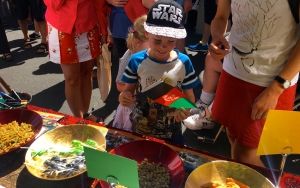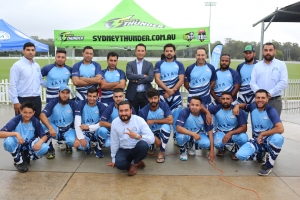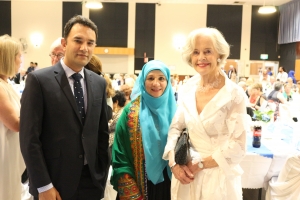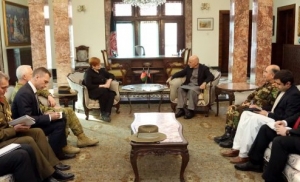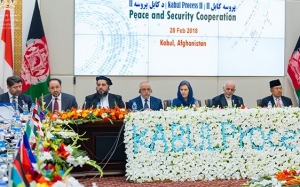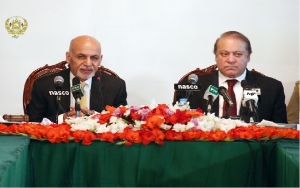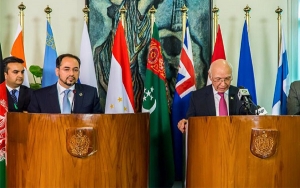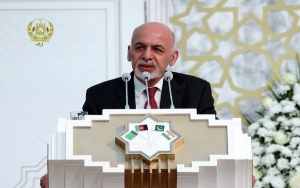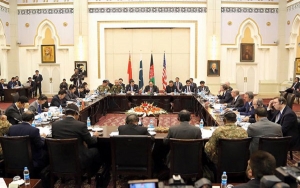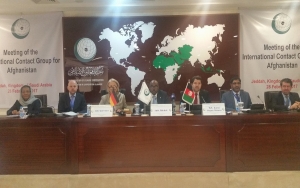Canberra, February 17, 2018 - Afghanistan's pavilion at the Canberra's National Multicultural Festival 2018, which is held annually in the city of Canberra, was welcomed by warm and unprecedented visitors.
The cultural and information booth was organized by the Embassy of Afghanistan and was openned for one day.
Young Afghan activists from Melbourne contributed to this event through displaying of carpets, dried fruits and informative publications.
To see pictures visit our Facebook page or click here. Sydney, 25 Feb. 2018 - Ambassador Wahidullah Waissi attended at the closing ceremony of the first Afghan community AYC Cup cricket gala day in western Sydney.
The Afghan Australian Youth Association (AAYA), which was teaming up with the Australian Federal police (AFP) and NSW Police force hosted the first community AYC Cup cricket gala day in western Sydney aimed at building stronger ties between the police and Afghan community particularly the youth.
It has been a great initiative for the Afghan youth as part of their first programmatic activity under the AAYA.
Sydney, 24 Feb. 2018 - Ambassador Wahidullah Waissi together with the former Govornor General of Australia the Honorable Dame Quentin Bryce and with other 300+ women & men participated at the 20th Anniversary of Mahboba Promise celebration in Sydney.
Ambassador Waissi praised Mahboba Rawi's dedication and committment during past 20 years in his speech.
This event was to celebrate Mahboba Rawi's tireless work, commitment, compassion and setting a remarkable pathway for improving the life of Afghan women and orphans.
Founded in 1998, Mahboba’s Promise began its mission by helping to care for Afghan refugees who had been forced into a refugee camp in Pakistan by a devastating earthquake in Takhar, Afghanistan.
Mahboba’s Promise’s projects include on education and homes for children, vocational skills and training for women, and support and health care access for the wider community; and over 15 years later, still stands as an organisation.
Afghan President Mohammed Ashraf Ghani met with Mrs. Maris Pine, Minister of Defense of Australia on 16 February 2018 in Kabul.
During the meeting, which was attended by Undersecretary General Mohammad Sharif Yaftali, Cheif of Army, both sides discussed the expansion of cooperation between the two countries, the fight against terrorism and the training of Afghan security and defense forces.
Mrs. Payne expressed her condolescence for the recent terrorist attacks to the Afghan people.
Mrs. Payne said that Australia is ready to work with Afghan government in the field of higher education, especially in the military sector.
The Australian Defense Minister noted that we support the position and strategy of the Afghan government in the areas of peace and the fight against terrorism and the expansion of regional cooperation. "Our cooperation with the government and the people of Afghanistan continues", she said.
President Ghani thanked Australia's cooperation in civilian and military affairs of Afghanistan. February 28, 2018
We, the high-level representatives from the region, members of the international community, and international organizations—participating in the second Meeting of the Kabul Process for Peace and Security Cooperation—express our support to the Government of the Islamic Republic of Afghanistan for organizing this Meeting. We thank H.E. President Mohammad Ashraf Ghani and H.E. Chief Executive Dr. Abdullah Abdullah for presenting their vision for peace and security cooperation.
We stress the necessity to conduct international cooperation, in accordance with the principles of international law, including that of sovereign equality of states and non-interference in their internal affairs. We reaffirm the central role of the United Nations in international cooperation to counter terrorist threats and the principles and purposes of the Charter of the United Nations, as well as the necessity to fully implement relevant resolutions of the United Nations Security Council with concern to terrorist threats to international peace and security
We condemn in the strongest terms the horrendous and unacceptable levels of terrorist violence inflicted upon the Afghan people—taking their innocent lives and deepening their pain each day—and reiterate our strong and unequivocal commitment and support to ending this suffering through an inclusive political process, as well as military actions, in their respective territories, against terrorists, terrorist sanctuaries, and terrorist support infrastructure wherever they are and without any distinction.
We reaffirm that the Kabul Process must lead to the renunciation of violence and breaking of all ties to international terrorism, as well as respect for the equal rights of all Afghans, including women, under the Afghan Constitution. Hence, we appreciate the Kabul Process as a main forum and vehicle under the leadership of the Afghan Government to lead peace efforts to end violence in Afghanistan. As Afghanistan’s immediate neighbors, regional countries, members of the broader international community and international organizations—participating in this Meeting—we support the early and full realization of this Process’ vital objectives.
Peace & Reconciliation
We reiterate our continued support to the Afghan-led and Afghan-owned peace and reconciliation process and collectively agree that direct talks between the Afghan Government and the Taliban—without any preconditions and without the threats of violence—constitute the most viable way to end the ongoing agony of the Afghan people. After many years of continued war and violence in Afghanistan, which have killed and maimed countless of Afghan citizens, Afghans deserve to live in sustainable peace and prosperity. Therefore, we also reiterate the call we made on 6 June 2017 in the first Meeting of the Kabul Process on all armed groups to start peace talks with the Afghan Government and cease violence immediately. We strongly support the Afghan Government’s commitment to forging a practical plan for reconciliation, which includes negotiation of various issues and any contested aspect of the international community’s future role in Afghanistan.
In this Meeting, the Afghan Government has reiterated its will and determination for peace through dialogue. The countries in the region and the international participants call on the Taliban to pursue their goals through direct talks with the Afghan Government with the aim of an ultimate political settlement that leads to their dignified return to a peaceful life. A peace agreement will be a victory for all its parties and a defeat for none. We, the representatives of the international community, recognize that for the success of their dialogue, both the Afghan Government and the Taliban will need firm international support and assistance. Consequently, we assure both parties of our strong will and commitment to stand behind an intra-Afghan dialogue for sustainable peace and security in Afghanistan. We are equally united and determined to pursue those who continue down the path of violence, taking the lives of innocent people, and commit to disrupt their supporters and financiers.
As noted in the Afghanistan’s National Action Plan on Women, Peace, and Security, women’s full and meaningful participation in reconciliation should be a cornerstone of any lasting peace. We welcome the Afghan Government’s continued commitment in this regard—as evidenced by the increased number of female members in the reformed High Peace Council—and pledge our continued support for the implementation of the National Action Plan.
We also acknowledge the significance of trust-building and strong bilateral relations between Afghanistan and its neighbors as an important element for ending violence and reaching durable peace in Afghanistan and ultimately improving the stability and prosperity of the whole region.
Security Cooperation & Counter-Terrorism
We acknowledge that while terrorism is a serious and growing common threat to all of us, there is urgent need for common understanding and cooperation through necessary mechanisms, including those of the SCO and others, in the region against this menace particularly by us—the participants of this Meeting—in support of Afghanistan as the front-line state against over twenty domestic, regional, and transnational terrorist groups.
While fully appreciating the scope and gravity of threats posed to Afghanistan, its neigbours, the region, and the entire international community by these domestic, regional and transnational terrorist groups, we commit to undertake coordinated measures against these terrorist groups regardless of their location and with no distinction.
We fully support resolution A/RES/60/288 (2006) that adopted the UN Global Counter-Terrorism Strategy and Plan of Action for its implementation, through which member-states condemn terrorism as being unacceptable, criminal and unjustifiable in all its forms and manifestations, and without any distinction of any sort. Further, as stated in the Strategy, as a measure to prevent and combat terrorism, we emphasize that states must “refrain from organizing, instigating, facilitating, participating in financing, encouraging or tolerating terrorist activities and to take appropriate practical measures to ensure that our respective territories are not used for terrorist installations, or training camps, or for the preparation or organization of terrorist acts intended to be committed by other states or their citizens.”
We resolve to take practical steps towards an accelerated regional security and counter-terrorism cooperation with Afghanistan, which is essential for ending terrorist violece, advancing regional stability, connectivity, and economic cooperation. We also resolve to jointly address the threats posed by Transnational Terrorist Networks (TTNs), as well as Transnational Criminal Organizations (TCOs), which continue to terrorize our people, destabilize our states, and spread fear and terror. These groups move freely across our borders, join with local insurgents, enjoy safe havens, and seek to target our citizens and our governments.
In addition to bilateral counter-terrorism cooperation, there is an increasing need for a strong, consistent, collective and multilateral campaign against terrorism and the spread of its ideology, backed by a set of practical measures by each regional and international stakeholder. In this regard, we underscore the primary role of the states and their competent agencies—as well as the significance of state-to-state relations and cooperation amongst these agencies—in preventing and countering terrorism at the national, regional, and global levels. Therefore, we commit to actively engaging with the region and the international community through this and other multilateral counter-terrorism mechanisms to rid this region of this menace.
In conclusion, we once again reiterate our support to the Kabul Process for an Afghan-led, Afghan-owned peace and reconciliation process, as well as reaffirming our commitment to the necessary fight against terrorism to bring lasting peace, security, stability, and prosperity to Afghanistan. The next meeting of Kabul Process will assess the progress achieved on the above-mentioned areas. This Declaration is adopted on 28 February 2018 in Kabul, Afghanistan by Australia, Azerbaijan, Canada, China, France, Germany, India, Iran, Italy, Japan, Kazakhstan, Kyrgyz Republic, Korea, Norway, Pakistan, Qatar, Russia, Saudi Arabia, Sweden (Nordic Plus), Tajikistan, Turkey, Turkmenistan, United Kingdom, Uzbekistan, United Arab Emirates, United States, EU, NATO and UN.
To read President Mohammad Ashraf Ghani's speech, please click here.
Let me, at the beginning, thank the governments of Turkey, Kazakhstan, and China, the previous chairs and conveners of this conference, and to thank the government of Pakistan for their excellent arrangements and the hospitality offered to us. Let me also thank the people of Pakistan for having hosted millions of Afghan refugees over decades. Our bonds are deep, people-to-people sets of relationships. Unfortunately, recent events in Pakistan have forced us to host close to 350,000 to 500,000 of Pakistani refugees on our soil. The refugee issue is a common issue, like other issues that confront us. I had began with Allama Iqbal’s poem, so instead of reading it in English, allow me to read it in Dari. ***Reads poem***
As the Prime Minister earlier said, Asia is a body of water on Earth, of which the Afghan nation is the heart; from the discord of the heart, Asia’s disorder; from the concord of the heart, Asia’s accord. What is the status of discord and accord in the heart and what is Asia’s impact on it? Last year, in Beijing, I spoke of four transitions: the political transition, the security transition, the economic transition, and most significantly a transition to turn the culture of the state to being citizen-focused. In terms of the two main themes of this conference, let me take very quick stock, first, of what we’ve been able to do during 2015 to establish regional cooperation.
Afghanistan is becoming firmly anchored in Central Asia. I want to express our gratitude to the government of Turkmenistan for having taken a cluster approach to the development of infrastructure and linkages. Turkmen railways, transmission lines, highways, gas pipelines, and oil pipelines are reaching Afghanistan and imminently, we are going to inaugurate the TAPI pipeline in Turkmenistan. This is a very significant transformational event and hopefully also with H.E the Prime Minister, we will sign a 500 KV transmission line from Turkmenistan through Afghanistan to Pakistan, which will significantly change the energy picture in both of our countries. With Kyrgyzstan, Tajikistan on the one side and Uzbekistan and Turkmenistan on the other sides, two major other transmission lines, respectively called CASA 1000 and TUTAP are moving from ideas to implementation. We are also extremely pleased that the Port of Chabahar, jointly invested by Iran and India is moving from conception to implementation and the related railway structures. Also with China, the five-nation agreements on railways and related sets of connectivities is rapidly moving. In short, Afghanistan is rapidly moving towards regional integration towards Central Asia, East Asia, and West Asia. By contrast, our ambitious projects of cooperation for transit and for linkages through Pakistan have still remained at the level of conception and aspiration. I hope that this conference would result in significant movement on this too.
We have nine airports that were built with tens of billions of dollars, though courtesy of NATO/ISAF. We have moved to a project of creating in every single one of these airports, a special economic zone. The initial estimates are that between 2016 and 2032, we will be able to earn a revenue of 32 billion dollars from these airports. Afghanistan also, in terms of generation of energy, is finally moving from talking about our immense natural resources to the actual realization. The first hydro dam called India-Afghanistan Friendship Dam at Salma is going reach fruition next spring and we thank our partners. Next year, we are going to be able to generate 240 MW of power all from renewable, 42 from hydro, 100 from natural gas, and a 100 from solar. Our highway program will create the possibility in our railways for Herat to become the second city in Afghanistan to be linked to the Iranian system and then on to the Turkmenistan system. And, completion of the ring road will open the way for Iran to Tajikistan direct contact and on to China. These sets of possibilities speak of the potential that is there but also, what I’d like to respectfully bring and ask for studies is lost opportunities. 36% of our people live below poverty line, $1.25; if the line were $2 a day, almost 70% of our people. Poverty elimination is our most significant goal and I’m convinced that regional cooperation could allow us to have the types of rates of growth that would allow us to tackle the most fundamental weakness, which is the poverty and exclusion of three majorities: women, youth, and the poor. So, I urge the Secretariat of the Istanbul Process to actually document the costs of forgone opportunities in regional cooperation and the advantages that accrue from this.
In terms of the four transitions, very briefly, and then I come to main issue, which is regional security. Political transition in Afghanistan, we took the unusual step of forming the Government of National Unity. Let me assure, on behalf of Dr. Abdullah, the Vice Presidents, and the members of the Cabinet, that the Government of National Unity is an enduring phenomenon. We’ve learned from 300 years of discord that politics must become a win-win formula not a lose-lose proposition. And, that is an important part of the new political culture and as part of this, again, I strongly reiterate our commitment to a lasting and just peace, within which all movements that resort to arms convert themselves into political parties and participate in the political process legitimately. They need to reduce and renounce violence because violence is not the way in a democratic society and culture.
Last year in Beijing, I brought your attention that we’re facing one of the hardest economic transitions any country has seen. We inherited a deep recession bordering on a depression but we’ve imposed an austerity program and met all our agreements with IMF, including for the first time all the revenue agreements. This is creating the ground for launching a stimulus package and a through growth series of programs that would ensure that Afghanistan’s economy moves out of an aid-dependent entity into a self-reliance system, and as part of that, our location, our natural wealth, our water, our land, and entrepreneurial energies of our people will be harnessed. In terms of change of the culture of the state, there have been significant changes. Our first thing is our willingness to confront corruption. Kabul Bank had become a symbol of the failure of wealth. I’m very pleased to share with you that out of the over $800 million that they stole from the public purse, we’ve realized fully $450 million to the legal process and are determined to realize the rest. But, let me come to the security issue. On December 31st, 2014, the NATO/ISAF forces ended their combat role. I want to thank President Obama and the leaders of framework nations of Turkey, Italy, and our other colleagues from 14 nations that committed themselves to the Resolute Support Mission.
On security, our key goal was to generate peace. I’ve had to become a war president because an all-out war has been imposed on us. We’ve gone through seven phases of a war, each more intense than the previous one but I’m extremely proud, as the Commander-in-Chief of the Afghan forces, to share that the main objective of our enemies that was to divide Afghanistan into two political geographies has not been realized. Our people have paid an immense price. Our children have been murdered while playing in fields. Our women have been murdered while going shopping or attending schools. Our mosques have been attacked; our hospitals have been attacked. All civilian spaces, all spaces of public gatherings have been viciously attacked but our will and our resilience, I hope, has been demonstrated. Our will is strong and the Afghan Security and Defense Forces, contrary to the predictions of skeptics, have not only held together, they are learning fast and no vacuums have been created. Here, let me again thank the Commander of Resolute Support Mission, John Campbell, for his very able role in assisting and supporting us. I would also like to indicate our gratitude, first to President Obama for his very principle decision to extend the mission of the Resolute Support Mission, as well as leaders in Europe—Chancellor Merkel, Prime Minister Renzi, Prime Minister of Sweden, and UK Prime Minister Cameron, and leaders of 14 nations that have again joined us in supporting this mission. International forces will not have a combat role. Let me repeat, Afghan forces are fully assuming responsibility, but our true friends have come to help us and we express gratitude for this international solidarity. Let me also thank all governments that have financially supported us in addition to the governments that I have named, government of Canada, governments of Australia, Japan, and many other nations are supporting our security forces and this again is an act of international solidarity for which, on behalf of people and the government of Afghanistan, I say thank you.
Let me shift to the drivers of conflict. What is driving the conflict? Is it an insurgency or are we dealing with a much larger conflict, because to formulate a plan of action along the lines H.E the Prime Minister has suggested for regional cooperation, it is important that we name the problems. The first driver of the conflict is regional and international terrorism, Al Qaeda, Daesh and terrorists from China, Russia, Uzbekistan, Tajikistan, the Middle East are all, unfortunately, present on our soil. The courageous decision of Prime Minister Sharif to launch the military actions in Pakistan has created unintended consequences, bringing about the displacement of a significant number of these groups onto our soil.
What I bring to your attention is there is no historical precedent for solving this problem because the quarrel of these people is not with the government and people of Afghanistan. We are fighting on behalf of all of you but we are the ones, who are daily suffering some of the worst atrocities, including the butchering of our young children and our elderly, totally innocent, totally unharmful, but theater has become a part of this. The second issue is, unfortunately, these terrorist groups are not going to be a short-term challenge. I want to pay tribute to all the victims of terrorism, particularly in the recent events, Istanbul, Paris, Sharm-el-Sheik—the Russian plane—Mali, San Bernardino, it goes on. We do have a problem, it’s a global and a regional problem and it requires us to focus on it systematically and coherently.
The second issue is, Taliban began as an Afghan phenomenon, became a regional phenomenon. Tehrik-i-Taliban Pakistan launched a vicious attack on children in Peshawar to which very robustly, H.E. the Prime Minister, and the people and government of Pakistan responded. But, that very response has brought them on to our country. Until now, we have launched 40 operations by our special forces against them but the question that this raises is what is the nature of the Taliban and how do we deal it because that question needs exploration? Can we have two standards, one standard, how do we differentiate between reconcilables and the irreconcilables? What are the networks that enable these people, devoted to violence rather than political dialogue, to continue? How do we coordinate regionally in order to deal with this phenomenon? And, it’s important, I think, in this regard to create a mechanism of verification, a mechanism of regional cooperation, in seeing how the networks of terror coordinate, who finances them, what is their linkage with the criminal economy, the drug economy particularly, but the rest of the criminal economy? How is radicalism shaping and maligning our holy religion and our opportunities for global engagement and dialogue?
On the third issue, I will be brief, because H.E. Prime Minister just stated something very significant, which we welcome. In Afghanistan, there was considerable uncertainty, whether Pakistan would truly acknowledge a sovereign Afghan state, with its legitimate government and its legitimate Constitution? Your words today have gone a very long way to assure us in this regard and that opens up the possibility of a sustained dialogue among us.
Given the threat of terrorism, we need to recognize that terrorism, while morally an aberration, has become a sociological system. It has a distinctive ecology of competition and cooperation. It’s a regional, national and global phenomenon. It has a morphology, meaning it is changing its form very rapidly ─ If Al Qaeda was version one, Daesh is version six ─ and the worst feature of it is its pathology. Now it has directed its violence for the sake of violence, in order to overawe, make news and in order to put fear in the hearts of people. Given this threat, what is our response? So, I would like to highlight some issues.
First, Afghanistan has been a platform for international cooperation, we continue in this regard, and very much welcome the engagement of China and our other neighbors near and far, from India to Azerbaijan in the common quest for containing terrorism. States of the region must face the common threat that is the second issue. Without rules of the game where states respect the rights and obligations of mutual sovereignty and cooperate in the state-to-state sets of relationships, we will have enormous difficulty containing terrorism. In the past, there have been occasions, where there has been great temptation to use non-state actors as instruments of policy, whatever the justification of those behaviors in the past, in the current threat environment; we must distance ourselves from malign non-state actors because the word of state is a word of predictability and key to prosperity.
In this regard, we suggest that the Istanbul Process in association with regional mechanisms of security cooperation, convene a meeting regarding regional cooperation precisely what H.E. was suggesting to give it concrete shape and movement forward. Our relations with Pakistan, first again let me state as H.E. stated, millennia of relationships bind us to South Asia. Afghans, Tagore famously give us a brand that a a millions a dollars of advertisements could not do through a short story of Kabuli Wala, have been on the move. We have been entrepreneurs, we have connections, and there are millions of refugees in Pakistan and in Iran. The dignified return of these refugees is absolutely central to regional cooperation and that requires coordination in the elimination of the threats that currently haunt us. With regional cooperation, I’m confident that we could generate double-digit growths that ensure poverty elimination. But, our central issue is state-to-state cooperation and that again is multi-dimensional, political-to-political, military-to-military, economy-to-economy, and finally intelligence to intelligence. We need to create the framework for comprehensive cooperation so that, in the light of the drivers of conflict, we can fashion solutions that are going to be lasting. Peace, therefore, is not equivalent to reconciliation. Peace requires dealing with all the drivers of conflict so that a multi-dimensional peace that truly will ensure that all of us live in harmony, that all of us can count on each other for enforcing an agreed set of rules of the game is as such. As part of this, because H.E. the Prime Minister and I both do not believe in blame games, we would like to suggest mechanisms of verification. Again, Istanbul Process and association, with regional and international security organizations should reach agreement on a mechanism of verification, as to what type of actors threaten our common interests because with a proper regime of verifications, we could fashion the instruments of cooperation.
Let me again, in conclusion, thank H.E. the Prime Minister for hosting us, for inaugurating the meeting. You’ve honored me by coming to the airport, a rare privilege Mr. Prime Minister. On behalf of the Afghan people and the government and myself, let me thank you. And, let me again thank Mr. Sartaj Aziz for the excellence of the arrangements. I’m sure that the proceedings of the meeting will be very productive and we can count on 2016 being very different than 2015. In 2015, Afghanistan was forced to fight for its survival. I hope that with this meeting, 2016 would be a year, where we embark on a path of true stability and prosperity in coordination and cooperation with our neighbors, near and far.
Thank you.
Thank you Excellency,
Honorable members of the press, Good afternoon,
Before starting to share a few main points about the Fifth ministerial conference of the Heart of Asia –Istanbul process andthe Islamabad declaration, I would like to take a moment to express my sincereappreciation and gratitude to my dear colleague His Excellency Sartaj Aziz for his tireless contributions throughout the year particularly his hard work today as co-chair of this conference.
I also want to thank the Government of the Islamic Republic of Pakistan for hosting the fifth Ministerial Conference of the Heart of Asia- Istanbul Process andtheir gracious hospitality.
During our discussions today weacknowledged the importance of the Heart of Asia Process as an effective regional platform aimed at a stable, peaceful, prosperous and developed Afghanistan and the region. An initiative that seeks to complement other existing regional initiatives and processes for promoting cooperation among us.
Today’s conference resulted in the adoption of Islamabaddeclaration that reflects a wide range of commitments by the participating and supporting countries and supporting regional and international organizations of the Heart of Asia – IstanbulProcess.
As appropriately themed “ enhanced cooperation for countering security threats and promoting connectivity in the Heart of Asia region”, this ministerial conference comes at a moment when in-depth discussions and consensus on these two areas are of great importance.
In this context, we noted that the security threats we are facing are not confined to a particular country and there is need for timely collaborative measures to be taken in order to prevent its spread to the entire region.
Hence, the need to explore a collective security approach and pursue a common counter-terrorism strategy was highly emphasized.
Dear Friends,
Afghanistan is at the forefront of the war against terrorism, fighting regional and international terrorist groups and safeguarding the region against the spread of terrorism. Hence we made a call on our regional and international partners to work with us and provide the necessary assistance so that we can continue this battle.
To address the issues of terrorism and violent extremism, we agreed that specific measures and actions should be taken to deny terrorists' access to financial and material resources.
In this context, we tasked relevant Senior Officialsto hold a meeting, in the first half of 2016, on security issues and counter terrorism measures.
Similarly, We agreed that economic development is vital to our overall welfare,prosperity, and stability. The conference urged cooperation among regional countries on projects that have the potential of transforming Afghanistan as a transit hub in the Heart of Asia region.
We concurred that making the customs procedures and policies easier, is imperative for removing barriers and would help facilitate smooth movement of goods and increase the economic growth and welfare of this region.
Last but not least, we thank all countries,including the RepublicofIndia,for offering to host the Heart of Asia – Istanbul Process’s Ministerial Conference as Co-chair in 2016.
With this, I want to open up for a few questions.
Thank you all for your presence here
In the name of God, the Compassionate, the Merciful
President of Turkmenistan, dear brother, Vice President of India, Prime Minister of Pakistan, heads of delegations, members of the Turkmenistan cabinet, ladies and gentlemen!
Today, we are witnessing a truly historic event. Why is it historic?
First, because we are overcoming the history of doubt and skepticism. For decades, there has been talk of this project; today, we are showing that we are determined to make our vision a reality.
Second, it is a historic because it shows that Turkmenistan, Afghanistan, Pakistan and India will be renewing ties that have bound us together for several millennia but due to the event of the Soviet Union were ruptured.
Third, it is historic because it shows that the positive neutrality policy that has been adopted by Turkmenistan is creating the conditions for good neighborly relations among all of us; Turkmenistan is unique in that it is created positive relations with every single one of its neighbors and we in Afghanistan are particularly privileged that we are such a good neighbor. And we want to congratulate you on this occasion again on the 20th year anniversary of Turkmenistan’s neutrality.
It is also historic because the Paris agreement on the climate has just been concluded and this project will ensure that Afghanistan, Pakistan and India will all have a positive carbon footprint. Congratulations on moving the first goal point!
My second point is advantages of cooperation. We live in a part of the world where rules of the game until now have not been in place for sovereign states to cooperate together; some in the past saw inference or misery in one country as an advantage; today all of us are committing to a stable and prosperous region, not just stable and prosperous countries. Our entire region will now benefit from the advantages of cooperation because our economies will move much more together, much faster, much more rapidly and in a much more integrated way if we cooperate. Key deficits in the energy sector will be met through this cooperation but what we welcome particularly that TAPI today will be the harbinger of much greater cooperation between Central Asia and South Asia.
Today, we are truly marking a new history of cooperation between Central Asia and South Asia, not as two separate regions, but as one economically integrated continent and this will be a harbinger of Asian continental integration.
My third point is that TAPI is the beginning of a cluster approach to infrastructure. First, comes the gas pipeline but the discussions that we have had among four of us have resulted in agreement that TAPI will be accompanied by a fiber optic network as well. This will be the quickest way and the most reliable way from India to Pakistan to Afghanistan to Turkmenistan all the way to Europe and that is significant. In addition, later we will witness another historic first which is transmission of electricity from Turkmenistan through Afghanistan to Pakistan which will run parallel to TAPI.
We in Afghanistan are committed to make the railways, highways and our canals and water management all brought together so what we see is not TAPI but a super highway of cooperation and coordination that will connect again South Asia and Central Asia together.
TAPI is a demonstration of our political will of all the leader and I would like to congratulate the government of Turkmenistan, the government of Pakistan and the government of India for making sure that political leadership is not only the vision but the commitment to make the vision a reality. Every step of the way this political commitment is going to manifest itself in making sure that if there are any obstacles technically, they are going to be resolved through political will. We have demonstrated in the past year that when we work together and we work jointly there is no obstacle that we cannot overcome and this political will is a message to our people, to the region and to the world that we are ready to transform the lives of our people. The transformational impact of this project is going to be very substantial. The first dividend of this project is a commitment to security, stability and cooperation in the region.
Afghanistan, which has suffered long from a variety of drivers of conflict, though this project sends a clear signal that we are ready for a new dawn, a dawn of cooperation, a dawn of working together where mutual benefits are going to define the rules of the game, not mutual disadvantages and negative competitions. There will be significant impact on the lives of people in Pakistan and India because natural gas is a key ingredient and it is not just in its natural form but the transformational impact of natural gas on all aspects of our lives is immense. It will also have an immense impact on the construction industry; building this pipeline is going to require an immense set of investments in related set of industries; it creates jobs in varieties of ways and it also provides the grounds for cooperation and joint ventures among many firms and entities. The impact on a series of our provinces in Afghanistan will have national impact as well as regional and hopefully global impact.
At the end, let me conclude with a series of congratulations and thanks again. First, congratulations again Mr. President for the 20th year anniversary of Turkmenistan’s declaration of neutrality. The vision that brought that commitment has paid off enormously for the people of Turkmenistan but it has not only paid off for the people of Turkmenistan; it has paid off for all of us. Many many happy anniversary and many returns.
I would also like to thank the people of Turkmenistan for enormous welcome that they have shown to us, your guests and your partners. I would also like to thank the people of Mary for turning out. The welcome, when you see thousands of the citizens of the city greeting their guests, it is enormously moving; it is also my great pleasure to thank the children of Mary; there is nothing more moving, Mr. President, to be greeted when you descend from the airplane by two beautiful children coming to embrace you; so children of Mary a very very big thank you.
I would also like to join you to thank the Asian Development Bank for its immense technical work over the years and for its strategic patience; many a year, many a month, they faced the challenge of naysayers including those on their board that said this is a (unintelligible) dream, do no follow it; so I would like to thank those people who have stayed during these 14 years with the vision and have now brought it to the stage of realization. The government of Japan that has been a friend of all of us, I also would like to stay a special thank you as well as to all others; but my largest thanks go to my fellow leaders, the Prime Minister of Pakistan, the President of Turkmenistan and the Vice President of India for today making a decision that we are not only are willing to overcome the history of the past but to create new history. Long live regional cooperation and our mutual friendship
The second meeting of the Quadrilateral Coordination Group (QCG) of Afghanistan, Pakistan, the United States and China on the Afghan Peace and Reconciliation process was held in Kabul on January 18, 2016. The delegations were led by Afghan Deputy Foreign Minister Hekmat Khalil Karzai, Pakistan’s Foreign Secretary Aizaz Ahmad Chaudhry, the US Ambassador to Afghanistan Michael McKinley and China’s Special Envoy for Afghanistan Ambassador Deng Xijun.
Taking note of the joint statement of January 11, 2016 and building on the outcome of the first meeting of the QCG, the group discussed and made progress on a roadmap towards initiating peace talks with Taliban groups that reflects the shared commitments of the QCG member countries. The roadmap aims to set specific measures that are necessary for creating a conducive environment for the commencement of Afghan led, Afghan owned peace talks between representatives of the Government of Afghanistan and representatives of Taliban groups aimed at reduction of violence and establishing lasting peace in Afghanistan and the region. To this end, the QCG called on all Taliban groups to enter into early talks with the Afghan government to resolve all differences politically in accordance with the will and aspirations of the entire Afghan nation and the desire and support of the QCG member countries for lasting peace in Afghanistan.
The participants of the QCG once again emphasized the need for an end to the senseless violence against the Afghan people. The QCG countries agree that all forms of terrorism presents a grave threat to countries, the region and the world. The members indicated their commitment to a robust effort to eliminate all forms of terrorist groups, regardless of their national origin, operating in their respective territories.
The QCG member countries agreed that friendly, mutually respectful and cooperative relations between the member states of QCG are necessary to create an enabling environment for the peace process in Afghanistan, which will help ensure the security, stability, prosperity, and interests of the region.
The QCG agreed to continue regular meetings to advance the Peace and Reconciliation process in Afghanistan. The group will hold its next meeting on February 6, 2016 in Islamabad.
Jeddah - The International Contact Group (ICG) met in Jeddah to discuss the political, security, and economic situation in Afghanistan. The meeting was hosted by the Organisation for Islamic Cooperation (OIC) and co-chaired by Ambassador Sabine Sparwasser, German Special Representative for Afghanistan and Pakistan, and Mr. Hekmat Khalil Karzai, Deputy Foreign Minister of Afghanistan. Over 50 ICG Member States and multilateral organizations participated.
ICG Members affirmed their commitment to strengthen and renew cohesion among all of Afghanistan’s international and regional partners. They welcomed initiatives towards closer coordination among the key international and regional stakeholders to help stabilize and develop Afghanistan, underlining the importance of Afghan leadership and ownership.
ICG Members took stock of security developments and improvements in the performance of the Afghan National Defense and Security Forces. Acknowledging the sacrifices of the Afghan people and itsinternational partners over the past 15 years, they recalled that Afghanistan is a front-line in the regional and global fight against terrorism and violent extremism and that its security and prosperity are critical for ensuring regional stability and prosperity and maintaining international peace. They reaffirmed the enduring commitment of the international community to support Afghanistan in countering terrorism and violent extremism, noting the important role of the Muslim world in this regard.
Recognizing that Islam strictly forbids violence against innocent civilians and the production and trafficking of illicit narcotics and that it teaches peace and reconciliation, ICG Members reaffirmed that sustainable stability in Afghanistan can only be achieved through a political settlement between Afghans. They welcomed the agreement reached with Hezb-e Islami and expressed their support for the National Unity Government as the elected and legitimate government of Afghanistan in its efforts to engage with all armed groups in a political process leading to the renunciation of violence, breaking of all ties to regional and international terrorist networks and respect for the constitution.
ICG Members were briefed on the state of implementation of the agreed reform agenda under the “Self-Reliance through Mutual Accountability Framework.” Taking note of measures adopted to fight corruption, they urged the government of Afghanistan to pursue further vigorous policies in this regard. They welcomed overdue progress towards electoral reform and stressed the need to create capacity to implement reforms, especially those aimed at minimizing the risk of fraud, in preparation for free, fair, inclusive, and transparent parliamentary elections.
Looking forward to the Seventh Regional Economic Cooperation Conference on Afghanistan (RECCA) in Ashgabat, ICG Members emphasized that regional cooperation holds the key for economic development in Afghanistan. They noted that sincere regional security cooperation which promotes security for all states is a condition for enabling the whole region to develop economically. They noted the growing importance of Afghanistan and its neighbours sharing responsibility for development and stability in the region, including through developing a common counter-terrorism strategy that delivers tangible results.
The Contact Group thanked the OIC for its hospitality. On behalf of the Government of Germany, the Chair thanked ICG Members for their continued dedication to the support of Afghanistan.


